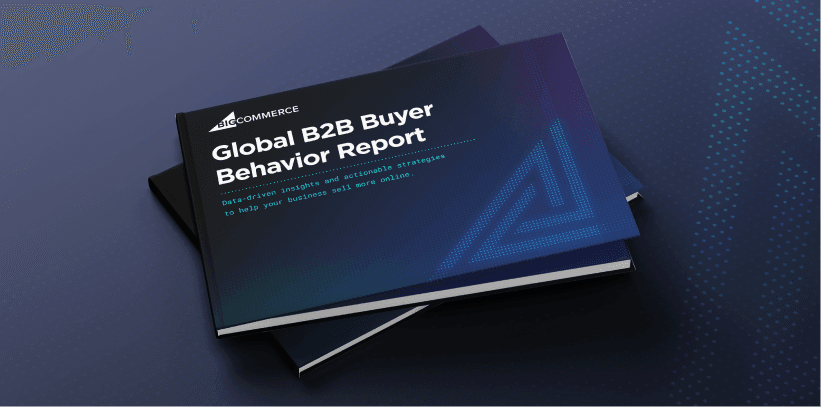
Explore Make it Big 2022 On Demand
Level up your ecommerce knowledge with future-focused content from our virtual Make it Big conference.

Mark Cuban Talks Disruptive Innovation at Make it Big 2021
From selling garbage bags door-to-door to owning one of Forbes’ most valuable franchises in sports — Mark Cuban knows what it takes to achieve long-term success.
At BigCommerce’s 2021 Make it Big Conference Day 1 keynote session, BigCommerce CFO Robert Alvarez sat down with renowned entrepreneur and Shark Tank investor Mark Cuban to discuss Mark’s entrepreneurial journey, shifting customer expectations and what goes into building a successful business.
Mark Cuban’s Key Takeaways at Make it Big
In their conversation, Mark Cuban shared lessons from his lifelong journey to becoming one of the world’s most successful entrepreneurs and investors. With entrepreneurial roots dating back to the early days of the internet bubble, who better than Cuban to also offer expert advice on disruption, digital innovation and the evolving ecommerce landscape?
Here are a few key takeaways from Mark Cuban’s Make it Big keynote:
Robert Alvarez: One of the phrases you coined is, ‘It doesn’t matter how many times you fail. You only have to be right once and then everyone can tell you that you are an overnight success.’ When did that hit home for you the most? When did you figure that out?
“It doesn’t matter how many times you fail. You only have to be right once and then everyone can tell you that you are an overnight success.” — Mark Cuban
Mark Cuban: “I don’t know that I’ve still figured it out, but you start realizing things that work and things that [don’t]. I try to follow that path of least resistance to get me to the next customer, and the next customer. And then you realize that there’s a bunch of them there, and that your company is growing and you’re making some money. And then, you learn that you don’t have all the answers, but you have to try to keep on learning and innovating and be agile.
“And when you start doing these things, and really the agility in that reiteration, and that continuous learning keeps on taking you to the next level as you guys found out, right? Because ecommerce — it’s not like there weren’t people there before, and it’s not quite as easy. And rare is the business where you’re not going to have any competition. And so, you have to always — particularly in the technology industry — the technology is changing every minute every day.
“I used to tell myself that there were two types of people in the technology industry. There were the people who wrote the software, and there was everybody else. And I was with ‘everybody else. And so, if I just outworked them and outlearned them and dug into whatever that technology was, I could exceed it and outperform all the ‘everybody elses’. And that really paid off for me because it just had me just grinding a little harder, working a little longer, learning a little bit more and not being stagnant. And you just keep on building that and then boom — you put yourself in a position to sell your company.”
RA: The pace of innovation in the last two years is crazy. What do you think about this digital wave in the next five to 10 years?
MC: “I think it’s happening, to your point, as we speak, AI is hard. Four or five years ago when we talked about AI — I think it seemed simpler. Machine learning seemed simpler. Just a needle in a haystack type thing, right? Just find something you otherwise wouldn’t find. But now if you look by market cap, the biggest companies are the companies that are the best at AI — the Googles and the Facebooks. Then those are your partners and your competitors at various levels. And so, being great at that is going to have a significant impact…
“How do we identify our customers or potential customers? How do we score those customers? How do we figure out the supply chain? How do we optimize the supply chain? These are all applications that aren’t as dramatic as, ‘I redesigned my product using AI’. You don’t really see those things. It’s all the optimization behind the scenes that where AI has the greatest impact. Your 3PLs, how do they store and ship? And by what means? And by what map? All these different issues that AI is addressing. So, that’s one big bucket.
“Now, it’s hard for individual users of ecommerce or any ecommerce platform to really get into that, right? As you’re growing you don’t want to get caught up with the new technologies. It still comes down to — do you have a great product or service, and can you put it in front of [customers]? And this is where you want to partner with companies like BigCommerce, because that’s what you guys are supposed to do, right? You go out there and find the best of breed and implement them and integrate them into BigCommerce. And so, you guys take a lot of that pain point off of it.
“And then we’re looking at crypto, right? The Mavs made an announcement that we’re going to be taking Dogecoin for merchandise. People are buying it. They want to use that. And we all know as marketers and merchants, that however your customers want to buy — that’s how you have to sell. You have to be the path of least resistance.
“However your customers want to buy — that’s how you have to sell.” — Mark Cuban
“And I think cryptocurrencies aren’t going to replace your traditional credit card or means of buying anytime soon, if at all. But, you know what? If you have a customer that really wants to transact that way, or even you as a merchant or vendor wants to transact that way for a lot of different reasons — for your cash management and how you deal with it — all these things are integrated and you don’t have to be an expert. That’s why you work with BigCommerce. But at the same time, you have to understand what your customers are doing and how they’re evolving as well. And those are two big themes that impact you.”
RA: When you think about the small business — and you’ve invested in 200 of them — you support them, you coach them, you mentor them. How do you advise them to set themselves apart so that they are the disruptor?
MC: “The first question is, ‘What’s your core competency?’ The second question is, ‘How great are you at your core competency?’ And the third is, ‘What’s your customer’s perception, and what are the results of those perceptions? And how do they deal with you? Are they selling? Are they buying or not?’
“Whatever your core competency is, you’ve got to stay focused on being great at it. And sure there’s times when companies pivot and there’s times when what you thought would work, doesn’t work. But the reality is, you’ve got to have something that you really hang your hat on, that you’re proud of, and that sets you apart. And when you have that, you’ve just gotta continue to stay ahead and be great at it. Not just good at it — great at it.
“And a lot of people always say, ‘Well, ask your customers what they want and give it to them.’ I don’t think customers really ask for what they want. I think customers seek what they need. And often, within your core competency, you have to try to understand your customers enough, to know that, ‘Here’s where I have to go next to try to give them what they’re going to need for their businesses.’ And if you’re a consumer product, what makes my customer happy? Why are they buying?
“I don’t think customers really ask for what they want. I think customers seek what they need.” — Mark Cuban
“When I got to Dallas Mavericks, everybody thought that we sold basketball. We don’t sell basketball — we sell fun. Going to a Mavericks game, going to a basketball game is about screaming and yelling and high fiving, feeling the energy when you walk into your building, right? So, you gotta know what your core competency is. You’ve gotta know what your product, what you really sell is then you gotta be great at it.
“Then you’ve got to find the best way to deliver. And in this day and age, you guys of BigCommerce know that changes rapidly. That changes, what do you inventory? How much do you inventory? What’s your lead time? What’s your supply chain? How do your customers want to buy? How do they want to receive? How do you want to deliver? All of this evolves in real time. But it all comes down to what’s your core competency, and what can you be great at?”

Krystin Gresham is a Content Marketing Manager at BigCommerce where she focuses on thought leadership content. Krystin holds a BBA in Marketing from Texas A&M University. With a background in both retail and tech, Krystin enjoys staying up on the latest retail and technology trends in the ecommerce industry. When she's not crafting content, Krystin enjoys traveling with her husband and volunteering with the Junior League of Austin.


